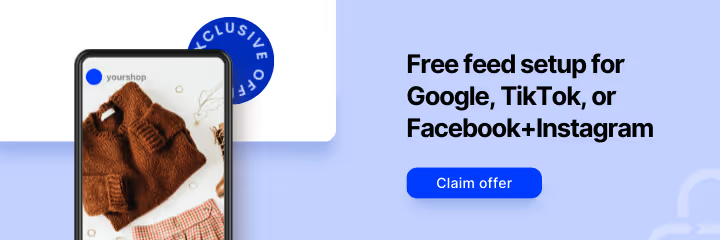Even the best designed and most user-friendly ecommerce websites rely on a steady stream of new and returning shoppers in order to be successful. This means that most online merchants must rely on marketing campaigns to drive potential customers to their digital doorsteps.
Whether you’re planning a new ecommerce website, or trying to build up sales in an existing site, it’s never too late to evaluate your options. While you can look to traditional marketing methods, it’s hard to beat the return on investment of internet marketing campaigns due to their comparatively low costs, and strong returns through optimization. That is to say, digital marketing campaigns are highly trackable, and as a result can be tweaked and improved to a high degree, allowing for better return on investment (ROI) over time.
Remarketing Ads

Platforms like Google AdWords, Steelhouse, and AdRoll offer the ability to target specific groups of shoppers that have interacted with your business, with specific online ads. For instance, if a shopper comes to your site and doesn’t make a purchase, it may be beneficial to show them ads reminding them to come back to your store to complete their purchase.
Such ads can be shown on various sites across the internet, such as news sites and blogs - in essence, following the consumer in a predetermined way. This helps you to maximize on traffic that you’re already getting, converting a higher percentage of “window shoppers” into customers.
Pay Per Click Advertising

Yes, we know that PPC advertising is not exactly a 'stealthy' digital marketing strategy. Nonetheless, PPC ads play a crucial role in driving traffic to your site and, therefore, deserve a mention.
Platforms like Google AdWords and Bing Ads allow you to run a wide variety of digital ads on the internet. For E-commerce websites, Shopping Ads are among the most common.
Platforms such as GoDataFeed can submit your product catalog to sites systems such as Google Merchant Center, allowing you to run ads in Google.com that show your product photos and prices. When shoppers click on these ads, knowing what a product looks like and costs, the chances that they’ll make a purchase are typically higher than you’d experience with other types of ads.
You can also run video ads on YouTube, Display ads on relevant sites that allow for advertising, and Search Ads that show standard text ads when users search for related keywords in sites like Google and Bing.
Search Engine Optimization (SEO)

Like PPC advertising, SEO is not a secret to ecommerce marketers, but it is key when building a solid ecommerce marketing strategy. Focusing on various SEO tactics is an absolute must if you want to attract more visitors to your site.
While paying for clicks may make financial sense, in many cases, it would be beneficial to earn Page 1 rankings in Google and other search engines for keywords that relate to your products and categories. Instead of paying for every visitor, you can enjoy unmetered traffic to your site.
It does take time and labor to compete in the organic / natural search engine results, especially if you’re in a competitive space, and don’t have historically strong rankings in the major search engines. Sites like Google use complex algorithms to determine these rankings, looking at dozens of factors, from your content, your loading speed, your mobile-friendliness, and even links from other relevant websites to yours. These backlinks can act as recommendations for your site. It’s always important to be aware of best practices for SEO, as breaking the rules can actually hurt your rankings.
Social Media Marketing

Depending on your products and target audience, you may be able to attract shoppers through social media platforms. B2B businesses have opportunities through platforms like LinkedIn, whereas B2C merchants are more likely to focus on Facebook, Instagram, Pinterest, and Twitter.
When planning social media campaigns, it’s important to decide if you’ll be running paid ads on these platforms, or focusing on generating organic interest through posting quality content and engaging with users on these platforms. Even if your goal is engagement, platforms like Facebook now make it harder for business posts to be seen without “boosting” posts with some advertising dollars. This can be a small budget but can be important in order to elicit the desired results. Quality social media posts with backlinks to your website can also help your SEO campaign.
Email Marketing

In the good ‘ol days, merchants would mail catalogs with the USPS seasonally to showcase new products and would send out supplemental mailings about sales and other happenings. Today’s merchants can save the printing and postage fees, and stay engaged more consistently with their customers through E-mail Marketing efforts. Such campaigns can help to keep your digital storefront at the top of the mind of shoppers and improve the lifetime value of your customers.
With the wealth of data collected by your shopping cart software, you can also look to send more advanced messages, such as Abandoned Cart Emails which make it easy for shoppers who leave your store with items in their cart to return to their cart and complete the checkout process. You can also segment your data in order to send special Emails, such as to your top shoppers, shoppers that haven’t visited in awhile, or shoppers who bought specific renewable products and may be due to re-order.
Digital Press Release

Have something newsworthy to share with the world? You can submit your press release online, affording the opportunity that it can be picked up by a wide range of online publications. This can also be one good source of backlinks for your Search Engine Optimization campaign, and be healthy for your business from a PR standpoint.
Local Directory Listing

If you have a physical location, such as a retail store or a showroom, consider a service to update your listings in digital directories. This can help people looking for merchants in sites and digital devices, such as Mapquest, Yahoo, CitySearch, SuperPages, YP, Waze, TeleNav, TomTom and hundreds of other directories, GPS databases, social apps, search engines, and mobile maps. This can also help your website to earn good backlinks, and help you to look more established when shoppers are researching you.
Affiliate Marketing

While it will often make sense to run your own marketing campaigns directly, some businesses find that engaging with publishers who will promote their business in return for a commission on E-commerce sales that they help to generate, can be lucrative. Publishers can include bloggers, social influencers, coupon websites, loyalty/points websites, news sites, E-mail marketers, and others with a captive audience.
Affiliate networks help you to solicit publishers to promote your offers, using materials like banners, Email templates, and content that you supply. Keep in mind that publishers benefit from being choosy about which websites they promote, so you’ll want to identify your site as a good candidate for this type of marketing before engaging in a campaign.
When in doubt, consider reaching out to a digital agency to help recommend new campaigns, audit existing campaigns, or help manage and optimize your digital marketing on an ongoing basis.




%20What%20Merchant%20Center%20Checks%20Every%20Time%20Your%20Prices%20Change.png)


